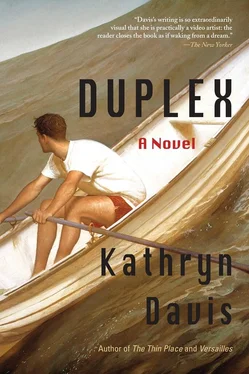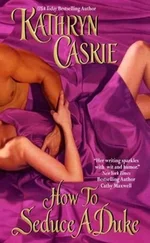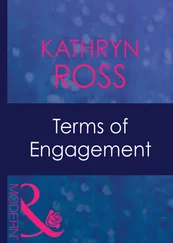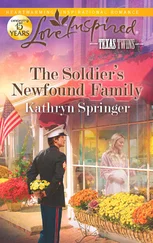The girl appeared to be a little younger than Penny but she was nowhere near as tall and her eyes were an intense bright blue, the kind of color not usually associated with transparent things but with things made of metal like weapons or tools, things that reflected external light but never generated it from within. Aside from her eyes, though, the new girl was a perfect replica of sixteen-year-old Mary — so exact that Marjorie practically fainted at the sight of her. What if Mary was dead and she was seeing Mary’s ghost? She didn’t rule out the possibility based on the new girl’s eyes, since everyone knew that eye color was one of the first things to undergo change in the afterlife.
The two girls embraced vigorously, kissing on the lips and sending their white arms and fingers all around and over one another. Then they came and joined Marjorie at the table.
Blue-Eyes was dressed in the same school uniform as Penny: a blue pleated skirt, a white blouse with a Peter Pan collar buttoned all the way to the top, a blue vest embroidered with the school emblem of a flaming child super imposed on a snowflake the same size as the child. On Penny the uniform had a crisp, fresh look; on Blue-Eyes it looked rumpled and damp, not unlike her hair, but maybe that was due to the fact that her hair was as limp and in need of washing as her mother’s often used to be. The girl’s skin, though, emitted waves of coolness the way a person’s skin does after swimming, and there was a blue tint to her lips, which were chapped and ragged as if she’d been chewing on them.
By now the sea had calmed down, the sky resting its palm soothingly across the face of the water. The first scow Marjorie had seen since leaving home appeared, moving very slowly and up so high she could barely tell what it was. Like a gleaming grain of rice, she thought — whereas no matter how far above the sea the scow’s operator managed to get, the sea would never look small to him.
“I’ve heard my mother talk about you,” Blue-Eyes said to her. “The two of you used to be friends — that’s what my mother told me. She used to live next door to you.”
“That’s where I still live,” Marjorie said. “I haven’t gone anywhere. Your mother’s the one who moved away.”
She tried to remember the last time she’d actually been inside number 49. At what point did the community association decide a person wasn’t coming back? They would send her dog to the pound and if no one found him as sweet as she did, he’d be put to sleep. Then there would be an estate sale and complete strangers would walk around inside her house, handling her private things, all of which would have price tags on them.
She couldn’t remember ever having said who she was, either, but both girls seemed to know.
“What do you mean you haven’t gone anywhere?” Penny asked. “You’re here, aren’t you?”
Blue-Eyes took Marjorie’s hand. “Do you ever see her?” she asked. “Did you see my mother before coming here?” She leaned forward and stared at her intently. “She was a nice girl, wasn’t she? Did she give you a present for me?”
Marjorie tried to remember. As a girl, Mary had never been what you’d call “nice.” The fact is, she could be moody and difficult to get along with. The other question was easier to answer, since Mary had never given her anything, but Blue-Eyes didn’t let her have the chance.
“Was she a good student?” she asked.
“She was a very hard worker.” Marjorie felt herself being wrung out like a piece of laundry. “She was the class artist.”
“I know that.” Blue-Eyes moved closer, bringing with her the chill of her skin, which felt very different from the deep interior chill of Marjorie’s own body. “What about my father? You knew him too, didn’t you?”
Out of all the memories left to her, Marjorie realized, and they were few and far between, she seemed to have held onto this one. It was like a dream, only it had happened. She and the sorcerer were sitting in a booth at the Captain’s Table, the waiter about to arrive to take their order. She was wearing a black dress of the heavy lustrous fabric they stopped making years ago and it set off her skin — back then she allowed just the right amount of animal fat in her diet to keep it creamy, and she hydrated enough to keep it translucent. “Do you always have to be such a goody-goody, Vicky dear?” the sorcerer was saying, lighting a cigarette for her even though he knew she didn’t smoke. “Keep the boy busy,” he instructed, and when she said “What boy?” he looked at her like she was one of the special children in room 12. Then he jumped up and took off down the hall after Mary. It was prom night; she had been a chaperone, though you couldn’t exactly say she’d done such a great job of it.
“Yes,” Marjorie said. “I knew your father. But it was a very long time ago.”
When the sorcerer returned, she remembered, he never took his eyes off her. What he was doing was keeping a firm grip on her gaze so she wouldn’t notice what he was really up to.
“The only human being he’s ever cared about is your mother,” Marjorie said.
“He cares about me, ” Blue-Eyes said. “Of course that’s different.”
A bell sounded, once, a single loud ding. “The timer!” Blue-Eyes said, jumping up and disappearing into the kitchen.
Once she was gone, Penny leaned closer, blinking her eyes at Miss Vicks and looking out at her from under her lashes.
“When she gets this way you have to ignore her,” she said. “She’s not like you and me.”
That was exactly what the sorcerer said, Marjorie thought, a million years ago.
None of it mattered anymore. There hadn’t been so many cars back then but even so everyone had to be careful — the kind of vigilance Marjorie had felt called upon to exercise ceaselessly seemed nowhere in evidence now. The sorcerer’s silver-gray car appeared out of nowhere; Mary’s forehead was spangled with stars. Eddie’s parents collected money to have a memorial put up. But the past was over. It was gone. It wasn’t anything.
When Blue-Eyes returned from the kitchen she was bearing a cherry pie between two pot holders. “Look what I found,” she said, waving the pie under Marjorie’s nose.
It smelled wonderful; as Blue-Eyes began to slice into it Marjorie could see the cherries bursting with juice. She tried to remember the last time she’d eaten anything — it had to have been before she rode off on the horse. She had been sitting on her living room sofa with a tray table in front of her, eating macaroni and cheese and watching the console. A man wearing what looked like a hazmat suit was balancing what looked like a pie on a broom stick, trying to get from point A to point B without dropping the pie while an enormous clock like the one in her classroom at school kept ticking. It was a funnier pie than the one Blue-Eyes had just brought in from the kitchen — something like banana custard, the kind of pie designed to make the man look especially stupid when he dropped it on his head. But before that happened she’d heard the thump and ran to the window.
“What do you think you’re doing?” Penny whirled to face Blue-Eyes. “The pie got burned! Don’t you ever listen? Sometimes a pie is really burned and you have to throw it in the garbage. Sometimes a person really dies.”
“I have no idea what you’re talking about,” Blue-Eyes said. She removed a slice carefully and set it on one of the waiting dessert plates. “Guests first,” she said, handing the plate to Marjorie.
“No!” Penny said. “You can’t make her eat that!” She turned to her and Marjorie could see that she was starting to cry. “You’re a teacher,” Penny said. “You know the story of the girl who ate the seeds — I think she’s the one I mean. Maybe I’m thinking of the hunters who lost their way. I used to know which story was which.”
Читать дальше












